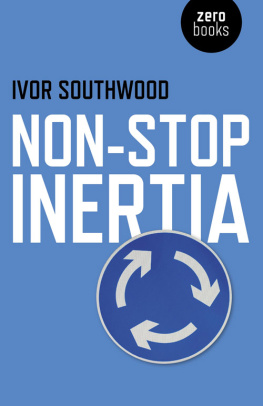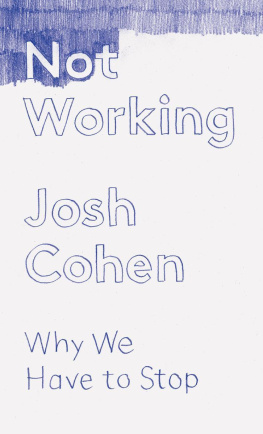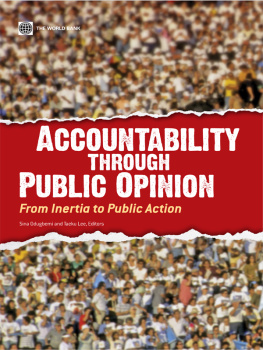Southwood - Non-stop inertia
Here you can read online Southwood - Non-stop inertia full text of the book (entire story) in english for free. Download pdf and epub, get meaning, cover and reviews about this ebook. City: Alresford;Hants;U.K, year: 2011, publisher: O-Books;Zero Books, genre: Politics. Description of the work, (preface) as well as reviews are available. Best literature library LitArk.com created for fans of good reading and offers a wide selection of genres:
Romance novel
Science fiction
Adventure
Detective
Science
History
Home and family
Prose
Art
Politics
Computer
Non-fiction
Religion
Business
Children
Humor
Choose a favorite category and find really read worthwhile books. Enjoy immersion in the world of imagination, feel the emotions of the characters or learn something new for yourself, make an fascinating discovery.
Non-stop inertia: summary, description and annotation
We offer to read an annotation, description, summary or preface (depends on what the author of the book "Non-stop inertia" wrote himself). If you haven't found the necessary information about the book — write in the comments, we will try to find it.
Non-stop inertia — read online for free the complete book (whole text) full work
Below is the text of the book, divided by pages. System saving the place of the last page read, allows you to conveniently read the book "Non-stop inertia" online for free, without having to search again every time where you left off. Put a bookmark, and you can go to the page where you finished reading at any time.
Font size:
Interval:
Bookmark:
- Stuart Hall, Brave New World, Marxism Today, October 1988, p24. Republished in revised form as The Meaning of New Times along with other essays in Stuart Hall and Martin Jacques ed., New Times: The Changing Face of Politics in the 1990s (Lawrence & Wishart, 1989).
- Hall, p24, 28.
- Arlie Russell Hochschild, The Commercialization of Intimate Life: Notes from Home and Work (University of California, 2003), p212.
- Hall, Brave New World, p28-29.
- See Nina Power, One-Dimensional Woman (Zero, 2009), p27-43.
- Herbert Marcuse, One-Dimensional Man (Routledge, 1991 [1964]), p3-21.
- Marcuse, p14.
- Marcuse, p20.
- Creating a new public sphere, without the state, interview with Paolo Virno by Hctor Pavn, 24 December 2004. http://libcom.org/library/creating-a-new-public-sphere- without-the-state-paolo-virno
- These include the EuroMayDay network, dedicated to organising annual protests against precarious work in European cities (http://www.euromayday.org/ ), and the Italy-based Chainworkers website (http://www.chain- workers.org/). The anti-precarity movement also has its own patron saint, San Precario. See Marcello Tar and Ilaria Vanni, On The Life and Deeds of San Precario, Patron Saint of Precarious Workers and Lives, in Fibreculture, Issue 5, September 2005. http://journal.fibreculture.org/issue5/vanni_tari.html
- Angela Mitropoulos, Precari-us? in Mute Vol. 2 No.0: Precarious Reader (2005), p16.
- Karl Marx, Capital Volume 1 (Penguin, 1976), p562, 580-82, 793.
- Although recent strikes in public sector and privatised companies in the UK have raised the profiles of some unions, this does not translate into the experience of much of the low-paid working population. Traditional union membership, for instance, does not lend itself to unstable work patterns with frequent moves, irregular income and no attachment to any particular trade. The argument for making the kind of support historically provided by unions more accessible to precarious workers is made by Anna Pollert in The Unorganised Vulnerable Worker: The Case For Union Organising (Institute of Employment Rights, 2007).
- Mitropoulos, Precari-us?, p16.
- Sonia McKays Agency and Migrant Workers (Institute of Employment Rights, 2009) presents an excellent summary of the precarious legal situation of migrant agency workers in the UK, including those employed by gangmasters.
- See for example McKay, p42-45, 51-52.
- Alain de Botton, The Pleasures and Sorrows of Work (Hamish Hamilton, 2009), p105-129.
- de Botton, p87-88, 256-257.
- Arlie Russell Hochschild, The Managed Heart: Commercialization of Human Feeling (2nd Edition) (University of California, 2003 [1983]), p7.
- Hochschild, p35-55.
- Michael Hardt and Antonio Negri, Empire (Harvard University, 2000), p293.
- Paolo Virno, A Grammar of the Multitude (Semiotext(e), 2004), p52-56.
- Hochschild, The Managed Heart, p203.
- Hochschild, p102-3.
- See Hochschild, p153-156 for the formulation of class and emotional labour; on gender and emotional labour, see p162-184; for discussion of supermarket cashiers, see p149-150.
- Virno, A Grammar of the Multitude, p91.
- Virno, p62.
- Marc Aug, Non-Places: Introduction to an Anthropology of Supermodernity (Verso, 1995), p111. Aug takes the term non-place from Michel de Certeau.
- The connection between Augs non-places and so-called non-people and non-services is made, perhaps somewhat over-simplistically, by George Ritzer in The Globalization of Nothing (Sage, 2004), p39-71.
- Manuel Castells, The Rise of the Network Society (2nd edition) (Blackwell, 2000), p406, 407-459.
- Aug, Non-Places, p103.
- For an excellent thematic overview of this film see Kim Nicolini, A Landscape of Impossible Options, Counterpunch, 5 February 2010. http://www.counter- punch.org/nicolini02052010.html
- On the organisational effects of outsourcing NHS support staff to private agencies, Polly Toynbees account of working as a porter in a London hospital is especially illuminating. See Toynbee, Hard Work (Bloomsbury, 2003), p55-84.
- Castells, The Rise of the Network Society, p296.
- For an analysis of this closed circuit of cyber-bureaucracy, see Mark Fisher, Capitalist Realism (Zero, 2009), p62-70.
- This phrase was used by television manufacturer LG in a recent TV advertisement to convey a message of commodified freedom.
- Raymond Williams, Television: Technology and Cultural Form (Routledge, 2003 [1974]), p95. Williams prescient study analysed the intertexual flow of TV, showing how it blended various and sometimes conflicting discourses into a single seductive rhythm.
- This phrase is lifted from Anne Friedbergs Window Shopping: Cinema and the Postmodern (University of California, 1994), p28. In Friedbergs text it refers to the sensation of movement produced in a static viewer by the panoramas and dioramas of the 18th and 19th centuries.
- Ian Sanders, Juggle! Rethink Work, Reclaim Your Life (Capstone, 2009), p5, 19, 121.
- Womans Hour, BBC Radio 4, 12 January 2010. http://www.bbc.co.uk/radio4/womanshour/03/2010_02_tue.s html
- Mira Katbamna, Homing in on the Future, Guardian, 4 July 2005. http://www.guardian.co.uk/money/2005/jul/04/careers.thegu ardian
- What is a Virtual Assistant? http://www.ukava.co.uk/ Accessed 15 May 2010.
- In a discussion of insurance industry occupations in The Rise of the Network Society (p266), Castells mentions the informational workplaces propensity for ideologically tailored new [job] titles (for example assistant manager instead of secretary) which aim to increase the commitment of clerical workers without correspondingly increasing their professional rewards. Of course VAs might argue that despite the insecurity, extra hours and lack of workplace support, their own professional rewards, in terms of money or status, have increased.
- Jack Lanigan, The Kingdom Did Come (undated autobiography), cited in John Burnett, Idle Hands: The Experience of Unemployment, 1790-1990 (Routledge, 1994), p170.
- See Marx, Capital Volume 1, p781-794.
- Wildes essay The Soul of Man under Socialism (1891) remains influential in questioning the automatic usefulness of work. On this and other historical examples of resistance to the ideology of work, see Owen Hatherley, Work and Non-Work: A Short History of the Refusal to Work as a Revolutionary Strategy, http://themeasurestaken.blogspot.com/2008/06/work-and- non-work.html 6 June 2008.
- The above quotes are from a talk given by Jobcentre advisors at a compulsory back-to-work session, 9 February 2010.
- Interpellation refers to the hailing of the individual in a particular way by an ideological authority, prompting a recognition of oneself as an ideological subject in those terms (for instance as the police officer hails a suspect). The term derives from Louis Althusser, in Lenin and Philosophy and other essays (Monthly Review Press, 2001 [1971]), p115- 120.
- Literally, in my case; claiming Jobseekers Allowance in July 2009 after eleven months of continuous employment, I discovered that because my partner was working full-time and I had been a postgraduate student from September 2006-7, I was not entitled to either income- or contribution-based JSA. To become eligible for benefit would have required moving out of the flat I shared with my partner and moving into a separate bedsit, or going back to my parental home 120 miles away (breaking up cohabiting couples is a DWP speciality). For various bureaucratic reasons, however, I was advised that it was still in my interests to continue signing on and presenting my Jobsearch Diary for inspection, even though I was receiving no benefit.
Font size:
Interval:
Bookmark:
Similar books «Non-stop inertia»
Look at similar books to Non-stop inertia. We have selected literature similar in name and meaning in the hope of providing readers with more options to find new, interesting, not yet read works.
Discussion, reviews of the book Non-stop inertia and just readers' own opinions. Leave your comments, write what you think about the work, its meaning or the main characters. Specify what exactly you liked and what you didn't like, and why you think so.









